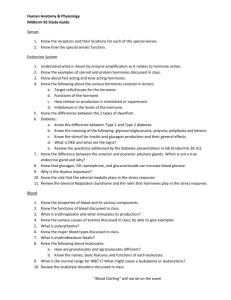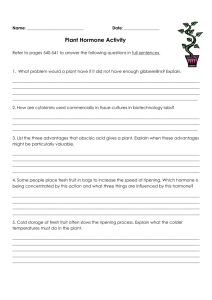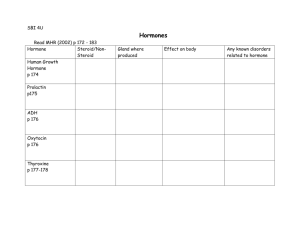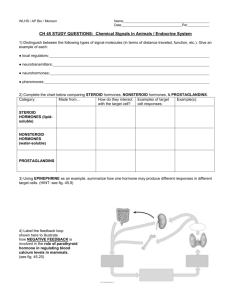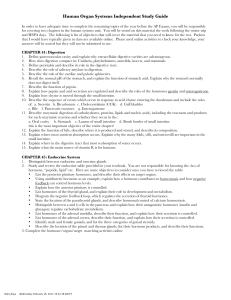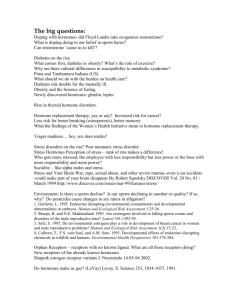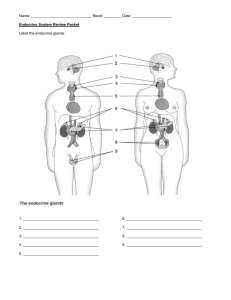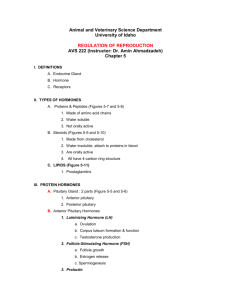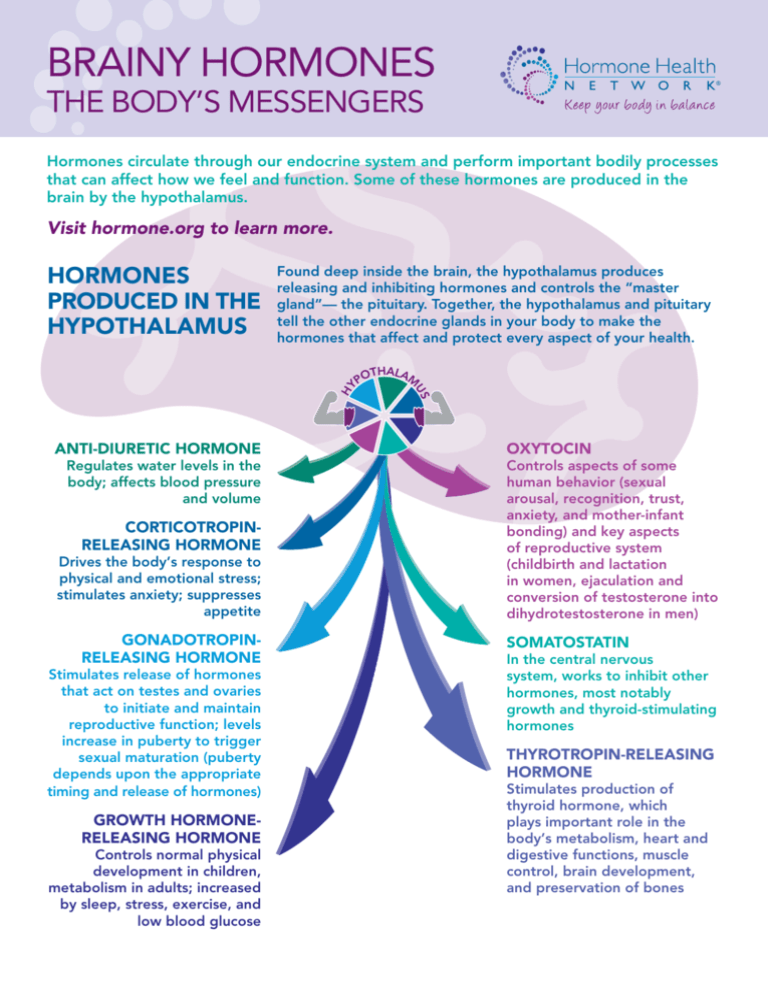
BRAINY Hormones
The Body’s Messengers
Hormones circulate through our endocrine system and perform important bodily processes
that can affect how we feel and function. Some of these hormones are produced in the
brain by the hypothalamus.
Visit hormone.org to learn more.
Found deep inside the brain, the hypothalamus produces
releasing and inhibiting hormones and controls the “master
gland”— the pituitary. Together, the hypothalamus and pituitary
tell the other endocrine glands in your body to make the
hormones that affect and protect every aspect of your health.
Anti-Diuretic Hormone
Regulates water levels in the
body; affects blood pressure
and volume
thalam
po
us
hy
Hormones
produced in the
hypothalamus
Oxytocin
CorticotropinReleasing Hormone
Controls aspects of some
human behavior (sexual
arousal, recognition, trust,
anxiety, and mother-infant
bonding) and key aspects
of reproductive system
(childbirth and lactation
in women, ejaculation and
conversion of testosterone into
dihydrotestosterone in men)
GonadotropinReleasing Hormone
Somatostatin
Drives the body’s response to
physical and emotional stress;
stimulates anxiety; suppresses
appetite
Stimulates release of hormones
that act on testes and ovaries
to initiate and maintain
reproductive function; levels
increase in puberty to trigger
sexual maturation (puberty
depends upon the appropriate
timing and release of hormones)
Growth HormoneReleasing Hormone
Controls normal physical
development in children,
metabolism in adults; increased
by sleep, stress, exercise, and
low blood glucose
In the central nervous
system, works to inhibit other
hormones, most notably
growth and thyroid-stimulating
hormones
Thyrotropin-Releasing
Hormone
Stimulates production of
thyroid hormone, which
plays important role in the
body’s metabolism, heart and
digestive functions, muscle
control, brain development,
and preservation of bones
Traumatic brain injury can affect the production levels of hormones
that originate in the brain and can lead to serious physical diseases and
disorders.
Genetics can also play a role in causing these conditions, and others beyond
the central nervous system. See an endocrinologist to get tested!
Hormone
Too High
Too Low
Anti-Diuretic
Hormone
Water retention, diluted
blood, seizure
Dehydration, blood pressure drop
CorticotropinReleasing
Hormone
Diabetes, high blood
pressure, osteoporosis,
abdominal obesity, acne,
dysfunctional menstrual
cycle, infertility, muscle
loss and weakness (i.e.
Cushing’s syndrome)
Weight loss, low blood pressure,
gastrointestinal distress,
anorexia nervosa, increased skin
pigmentation in areas not exposed
to sun (e.g. hand creases, gentials)
GonadotropinReleasing
Hormone
Disrupted connection
between the hypothalamus,
pituitary gland, and gonads
(i.e. menopause, removal of
the testes or ovaries)
Poor bone health, no puberty,
infertility (i.e. Kallmann syndrome)
Growth
HormoneReleasing
Hormone
Abnormal enlargement
of hands, feet, and skull
which alter facial features
(i.e. acromegaly), diabetes,
menstrual disorders
In children­—delayed physical
growth, delayed puberty
Oxytocin
Beyond the brain, linked to
enlarged prostate resulting
in urination difficulty
Linked to breastfeeding difficulty
in women, and autism/poor social
functioning in developing children
Somatostatin
Beyond the brain, diabetes,
gallstones, intolerance to
fat in the diet, and diarrhea
Variety of physiological problems,
including uncontrolled growth
hormone secretion
ThyrotropinReleasing
Hormone
Weight loss, weak muscles,
excessive sweating,
excessive menstrual flow
(i.e. hyperthyroidism)
Fatigue, depression, weight gain,
feeling cold, constipation, dry skin
and hair, hair loss, heart problems,
dyslipidemia, irregular menstrual
cycles (i.e. hypothyroidism)
(aka Growth
Hormone-Inhibiting
Hormone)
In adults—decreased muscle mass
and increased body fat
You have questions. We have answers.
The Hormone Health Network is your trusted source for endocrine patient education.
Our free, online resources are available at hormone.org.
Additional editing by Genevieve Neal-Perry, MD, PhD, University of Washington

